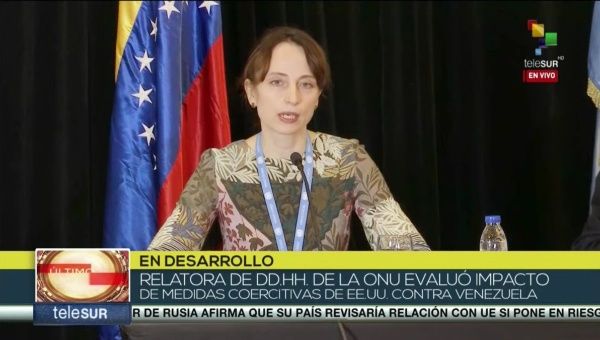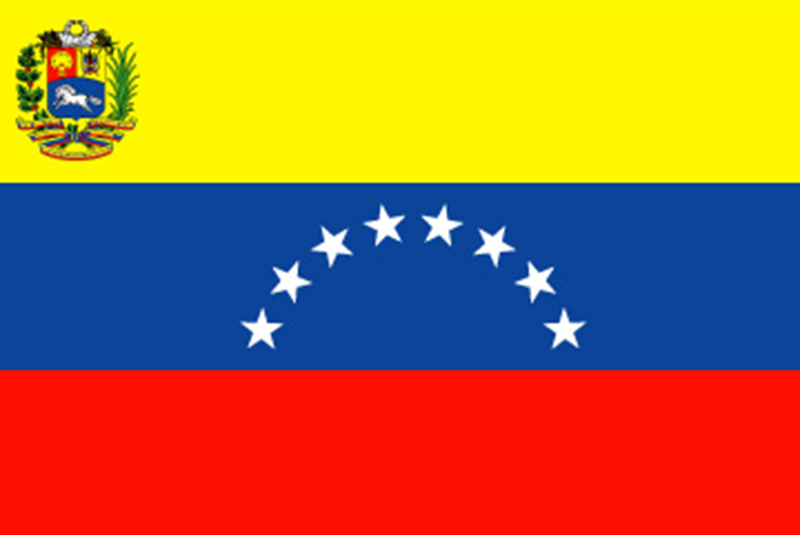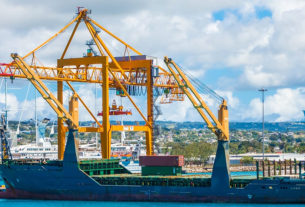CARACAS (12 February 2021) – The UN Special Rapporteur on unilateral coercive measures and human rights, Alena Douhan, today urged the United States, European Union and other states to drop sanctions imposed against Venezuela.
At the end of a two-week visit to Venezuela, Douhan said the sanctions have exacerbated pre-existing economic situations and have dramatically affected the whole population of Venezuela, especially but not only those in extreme poverty, women, children, medical workers, people with disabilities or life-threatening or chronic diseases, and the indigenous populations.
“The devastating effect of sanctions imposed is multiplied by extra-territoriality and over-compliance adversely affecting public and private sectors, Venezuela citizens, non-governmental organizations, third country national and companies”, said Douhan, — “humanitarian exemptions are lengthy, costly, ineffective and inefficient”.
“Lack of necessary machinery, spare parts, electricity, water, fuel, gas, food and medicine, growing insufficiency of qualified workers many of whom have left the country for better economic opportunities, in particular medical personnel, engineers, teachers, professors, judges and policemen, has enormous impact over all categories of human rights, including the rights to life, to food, to health and to development”.
“Due to the complexity of the situation I sought to meet the widest range of people to listen to their experience and insights. I met government officials, diplomats, international agencies, opposition leaders, non-governmental organizations, lawyers, doctors, teachers, academics, victims of human rights violations, representatives of private business and of the church, as well as ordinary people” Douhan said.
First sanctions have been imposed against Venezuela in 2005 and have been severely strengthened since 2015 under numerous allegations, with the most severe ones being imposed by the United States.
Douhan stressed that unilateral measures are only legal if they are authorized by the UN Security Council, or used as countermeasures, or do not breach any obligation of states, and do not violate fundamental human rights. She called on the countries to observe principles and norms of international law and reminds that humanitarian concerns shall always be taken into account with due respect to mutual respect, solidarity, cooperation and multilateralism. She plans to issue a full report on her mission in September 2021.
ENDS
Ms Alena Douhan (Belarus) was appointed as Special Rapporteur on the negative impact of the unilateral coercive measures on the enjoyment of human rights by the Human Rights Council in March 2020. Ms. Douhan has extensive experience in the fields of international law and human rights as, a Professor of international law at the Belarusian State University (Minsk), a visiting Professor at the the Institute for International Law of Peace and Armed conflict, (Bochum, Germany) and the Director of the Peace Research Centre (Minsk). She received her PhD at the Belarusian State University in 2005 and obtained Dr. hab. in International Law and European Law in 2015 (Belarus). Ms. Douhan’s academic and research interests are in the fields of international law, sanctions and human rights law, international security law, law of international organizations, international dispute settlement, and international environmental law.
Special Rapporteurs are part of what is known as the Special Procedures of the Human Rights Council. Special Procedures, the largest body of independent experts in the UN Human Rights system, is the general name of the Council’s independent fact-finding and monitoring mechanisms that address either specific country situations or thematic issues in all parts of the world. Special Procedures’ experts work on a voluntary basis; they are not UN staff and do not receive a salary for their work. They are independent from any government or organization and serve in their individual capacity.
For more information and media requests, please contact Christophe Peschoux (cpeschoux@ohchr.org)
For media enquiries regarding other UN independent experts, please contact Renato de Souza (+41 22 928 9855 / rrosariodesouza@ohchr.org and Kitty McKinsey (kmckinsey@ohchr.org)
Follow news related to the UN’s independent human rights experts on Twitter @UN_SPExperts.
Concerned about the world we live in?
Then STAND UP for someone’s rights today.
#Standup4humanrights
and visit the web page at http://www.standup4humanrights.org
XXXXXXXXXXXXXXXXXXXXXXXXXXXXXXXXXXXXXXXXXXXXXXXXXXXX
Venezuela: UN Human Rights Rapporteur Presents Her Observations


Interview: President of Indigenous Territorial Govt Twi Y…

China: Key Driver of the Global Economy From Pandemic
by teleSUR/SM ![]() Newsletter
Newsletter
Get our newsletter delivered directly to your inbox I have already subscribed | Do not show this message again

The report contains the evaluation of the impact of the blockade imposed by the U.S. on the Venezuelan population.
The United Nations Human Rights Rapporteur, Alena Douhan, offered a press conference to share the preliminary assessment of her visit to Venezuela to evaluate the effects of the United States’ blockade against Venezuela.
RELATED:
The report, summarized in an overview of visits to several states of the Venezuelan territory to observe the current situation of the country, together with the series of actions applied by the Government of the United States against the South American country, highlights the effects on food and health of the population.
Douhan highlights that the unilateral measures applied against Venezuela, its institutions and assets abroad, violate international law, as well as violate the rights of the country to respond to the needs of a people suffering the consequences of the blockade applied by the U.S. and its European allies.
The international rapporteur highlighted with concern the restriction in the access to the necessary spare parts to re-establish the functioning of machinery linked to the water and electricity systems, resulting in adverse effects on the population’s survival. The United Nations’ report will be presented in September to the National Health System.
In the press conference, Douhan also clarified that her visits’ agenda was organized with the United Nations’ Office of the High Commissioner for Human Rights, not by the government of Venezuela.
The UN rapporteur stated that the humanitarian crisis being experienced by the Venezuelan people is a direct effect of the sanctions imposed by the United States. Her visit and that of any UN official are based on independence, impartiality, and comprehensiveness.




